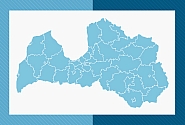
Latvia will have 42 municipalities instead of the current 119 after the 2021 municipal elections. This change comes with the Law on Administrative Territories and Populated Areas adopted in the final reading by the Saeima on Wednesday, 10 June.
“The administrative-territorial reform can be compared to an ultramarathon. In total, the Committee processed more than 800 proposals in more than 120 working hours. The relay baton of this race is eagerly awaited by other long-discussed and even partially undertaken reforms, such as the hospital and school network optimisation, which will now be able to go through much more smoothly,” previously said Artūrs Toms Plešs, Chair of the Administrative-Territorial Reform Committee.
The Committee Chair also noted: “By coincidence, we are deciding on the administrative-territorial reform at a time of crisis. On the one hand, we had to look for new decision-making formats, and we have proven that we can make important decisions remotely as well. On the other hand, the crisis has shown that this is the high time for the reform to be adopted. Strong and powerful municipalities are needed in possible future crisis situations.”
The Law prescribes the conditions and procedures for the creation, registration, modification of boundaries, and establishing of the administrative centre of administrative territories and county territorial division units; the procedure for determining the status of populated areas and their registration; and the competence of institutions in these matters.
The Law divides the Republic of Latvia into city municipal territories and county municipal territories. The county municipal territories are divided into towns and parishes (pagasti). The annex to the Law specifies the territories of the new counties, their towns, and their parishes.
The new Law also divides populated areas in Latvia into cities, towns, villages, hamlets, and farmsteads. The word pilsēta in Latvian stands for both ‘city’ (valstspilsēta) and ‘town’ (novada pilsēta). The status of a city has been granted to Daugavpils, Jēkabpils, Jelgava, Jūrmala, Liepāja, Ogre, Rēzekne, Rīga, Valmiera, and Ventspils.
Koknese and Iecava will acquire the status of town from 1 July 2021, while Ādaži, Mārupe, and Ķekava will become towns from 1 July 2022.
A separate law is to regulate the affiliation of cities, towns, and parishes with the historical territories of Latvia—Vidzeme, Latgale, Kurzeme, Zemgale, and Sēlija—in order to strengthen the common identity of the population and preserve and sustainably develop the cultural and historical environment. The Cabinet of Ministers has until the end of this year to draft such a law. Within six months of its adoption, the Cabinet will have to approve a sustainable development plan for the historical lands of Latvia and the living space of cultural and historical communities.
In order to carry out the shared functions of the state and municipalities, it is planned to establish the administrative regions of Kurzeme, Zemgale, Rīga, Vidzeme, and Latgale. Their status and operating conditions will be determined in a separate law that the Cabinet of Ministers has to draft and submit to the Saeima for consideration by 1 January 2021.
The Law tasks the government with preparing and submitting to the Saeima an annual report on changes in the socio-economic situation in municipalities and their territorial units, including an assessment of the benefits and downsides of the administrative-territorial reform.
The 2021 municipal elections will be announced by the Central Election Commission in the new administrative territories, and with the first meeting of each newly elected municipal council, scheduled for 1 July 2021, the powers of all former municipal councils will end. Each new municipality will take over the institutions, financial resources, property, rights, and liabilities of the former municipalities incorporated into the county.
The Law gives the Ministry of Environmental Protection and Regional Development until 30 September of this year to set up a methodology for municipalities that would enable new counties to start operating.
The Law provides for a transitional period so that appropriate changes can be made in the state registers and information systems in accordance with the new administrative-territorial division.
The municipal reform is intended to create economically viable administrative territories with municipalities that are able to ensure the fulfilment of their statutory autonomous functions in comparable quality and accessibility and provide quality services to the population at reasonable costs, according to the explanatory note to the Draft Law on Administrative Territories and Populated Areas.
Changes in the existing model of municipalities are necessary because the experience so far has shown that many local governments fail to provide all the social services the population needs. Furthermore, the per capita administrative expenditures of municipalities are quite high and prevent efficient use of state budget funds, and many local governments are unable to assume obligations to ensure development, states the explanatory note to the Draft Law.
Changes are also needed to create an efficient network of education, health-care, social assistance, road and transport, and utility infrastructure. They are also required to develop promising areas of economic activity in line with the wishes and needs of entrepreneurs and to adjust all types of necessary infrastructure accordingly, the authors of the Draft Law point out in the explanatory note.
The municipal reform law will enter into force on the day following its promulgation.
Saeima Press Service







